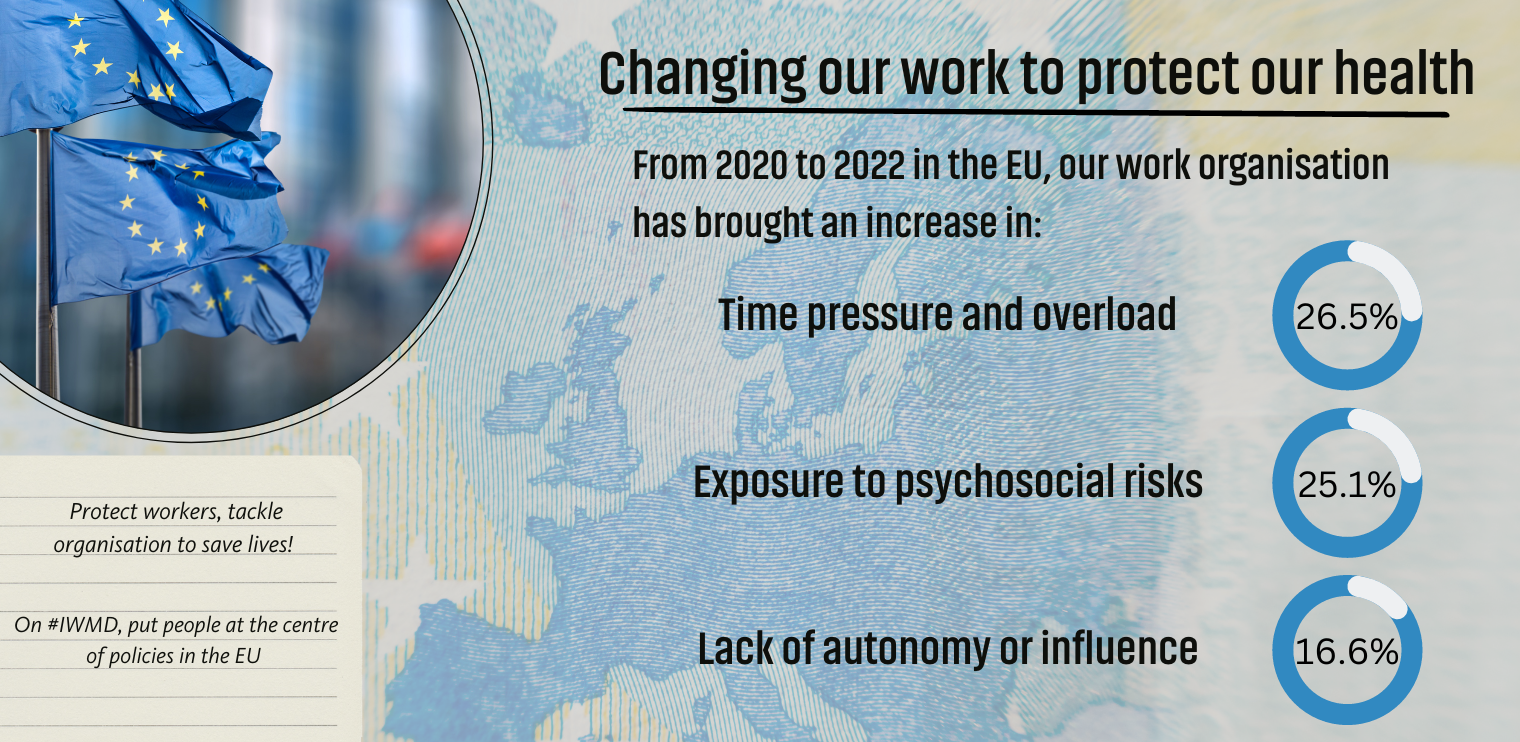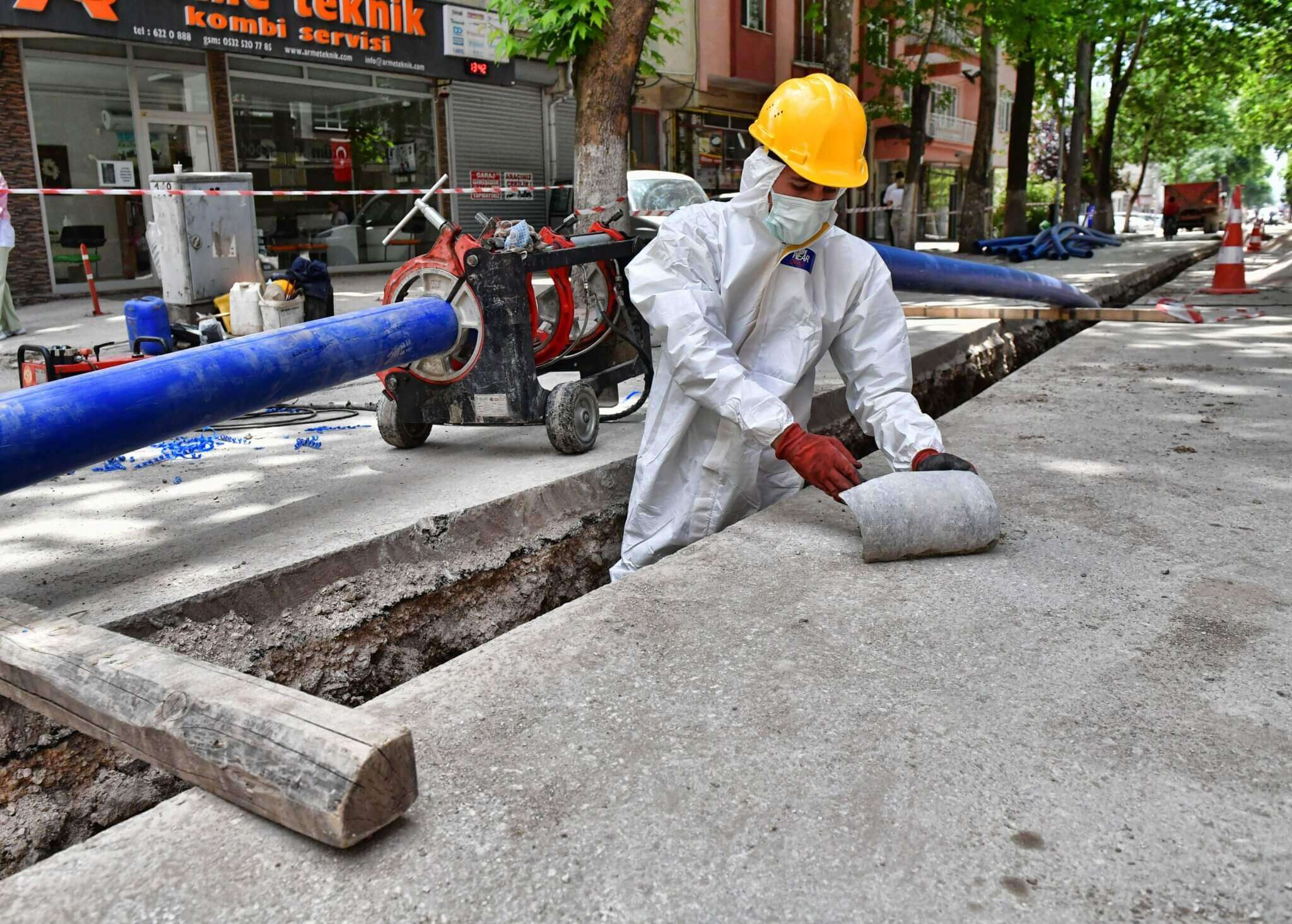Construction confederation BWI member, CFDT, made a 28 April call to have heat recognised as ‘bad weather’ and thus allow workers to stop their work.
Construction confederation BWI member, CFDT, made a 28 April call to have heat recognised as ‘bad weather’ and thus allow workers to stop their work.
BWI affiliate ACV conducted a ceremony with invited Italian unions to commemorate the Italian workers who worked in the mines in Belgium.
FTGB, another BWI affiliate, reported the results of a survey investigating the impact of atypical working hours on workers’ well-being (weekends, nights, etc.). The headline finding is that ninety per cent of workers on atypical hours will not “be able to last until 65 years old!”
In France, BWI member CGT conducted several activities to mark 28 April including a meeting at the Ministry of Labour, a protest
at a construction site of Grand Paris and the installation of a plaque in tribute to victims of occupational accidents and diseases.
On International Workers Memorial Day, BWI affiliates across the Pan European region gathered together to raise their voices and demand that occupational health and safety become a reality in every workplace across the continent.
Over the last year, BWI affiliates throughout Europe signed over 100 Declarations with employers and employer associations to recognise occupational health and safety as a fundamental worker’s right. Many BWI affiliates decided this year to return to employers who have signed the said declarations and meet with workers to see if the situation had improved over the year.
Tajikistan’s building workers union was able to arrange 27 union meetings with 500 workers employed in different construction sites. Workers voiced their full support for BWI “Make It Happen” campaign as they conceded that occupational health and safety remains a major concern in the construction industry.
Over 50 activities were organised by BWI affiliates across Europe to support BWI’s “Make it Happen” campaign, including meetings with workers, issuance of trade union statements and videos, TV interviews, conferences, and workshops.

April 28th is widely known as both International Workers Memorial Day and World Day for Safety and Health at Work, but recent findings show that commemoration and awareness raising are failing to alleviate the plight of workers.
The European Agency for Safety and Health at Work (EU-OSHA), in their report Occupational safety and health in post-pandemic workplaces, highlight how European workers are exposed to more risks now than before the pandemic. In speaking with over 27,000 workers throughout all 27 Member States, the report found that, on average in Europe, certain risks became more prominent. Exposure to time pressure/overload increased to 26.5%, psychosocial risks to 25%, while 66% of workers have experienced health problems caused or made worse by their work.
While there has been a general consensus post-COVID that workplace mental health must be spoken about more openly, participants across the EU are divided in their view whether disclosing a mental health condition would have a negative impact on their career: 16% ‘strongly agree’ and 34% ‘agree’ vs 13% who ‘strongly disagree’ and ‘32%’ who ‘disagree’. Awareness raising has clearly failed to change the culture within many European workplaces, with 27% of respondents reporting that stress, depression or anxiety has been caused by, or made worse due to their work.
Yet again we see non-binding initiatives resulting in workers suffering.
Trade unions have continually called on legislators to act in a more meaningful manner to eradicate exposure to risks in the workplace, with Europe’s mental health epidemic the latest in a line of preventable tragedies affecting workers and their families. While we move towards a vision of zero deaths at work in Europe, we match this ambition with an ominous reduction in workplace autonomy, increased surveillance of workers, the use of automation to determine workload and speed, and the introduction of digital tools without the necessary human oversight or training. These contradictory approaches are seen most clearly in our use of awareness raising campaigns to reduce the burden on workers, only for employers to escape any accountability when issues arise.
The pandemic afforded us an opportunity to re-imagine working life in Europe, and to re-orientate how we sought to balance professional and private life. It is now abundantly clear that we have failed to seize the opportunities presented to us in increased digitalisation, while the prospect of high-quality sustainable jobs for our green transition remains ambiguous at best. As the latest statistics show us, if we seek to make a real change, the window to do so is closing.
There is no denying that European workplaces have improved health and safety measures compared to the issues facing previous generations, but the rise in precarious working environments and arrangements, mental health problems caused/exacerbated by exposure to psychosocial risks, digitalisation without due diligence and automation of workloads has created a new series of problems for future generations. On both International Workers Memorial Day/the World Day for Safety and Health at Work, should we not seek to consolidate our victories, not work against them?
Հայաստանի արհմիությունների կոնֆեդերացիա organized a round table discussion on issues of health and safety in the workplace…

Le chiffre de 90 000 victimes annuelles en Europe de cancers liés à l’amiante pourrait encore gonfler, en raison de chantiers à venir et d’une trop faible volonté politique de prendre le sujet à bras le corps.
Il est urgent de mieux protéger, réduire les taux d’exposition, prévenir. L’appel vient de la CES, la Confédération européenne des syndicats, dont fait partie la FGTB. A l’occasion de cette journée internationale d’hommage aux travailleurs décédés ou blessés, le syndicat européen fait le focus sur les – beaucoup trop – nombreuses victimes de cancers professionnels liés à l’exposition à l’amiante.
Ces victimes, et leurs familles, appellent aujourd’hui les dirigeants européens « à offrir aux travailleurs le niveau de protection le plus élevé possible contre l’amiante. »
Les chiffres sont élevés. En Union européenne, environ 90 000 personnes perdent la vie à cause d’un cancer lié à l’amiante, chaque année. Ce qui en fait la principale cause de décès sur le lieu de travail. L’amiante provoque la majeure partie des cancers professionnels du poumon, et du mésothéliome, cancer qui touche notamment la plèvre.
Contrairement aux idées reçues, l’amiante est très loin d’avoir disparu des lieux de travail : entre 4 et 7 millions de travailleurs y sont toujours exposés en Europe. Et l’on serait loin d’en sortir. Paradoxalement, les travaux de rénovation des anciens bâtiments viendrait aggraver la situation, sans une prévention adéquate. « Ce nombre devrait augmenter de 4 % au cours de la prochaine décennie », indique la CES, « en raison de rénovations de bâtiments dans le cadre du Green Deal de l’UE. »
Balandžio 28 dieną minima Pasaulinė darbuotojų saugos ir sveikatos diena. Pirmiausia kalbama apie darbdavių pareigą pasirūpinti nekenksminga darbo aplinka fizinei sveikatai.
Lietuvos profesinė sąjunga „Solidarumas” šiemet nori atkreipti dėmesį į psichologinį smurtą (arba mobingą) darbo vietose, reiškinį apie kurį visuomenė vis drąsiau kalba, tačiau dar sunkiai atpažįsta.
Valstybinės darbo inspekcijos duomenimis 2022 metais skundų ir pranešimų dėl psichologinio smurto buvo g… See more
28 aprila, 2023 sindikat 0 Comments
U okviru Konferencije pod nazivom „Zdravo radno okruženje kao osnovno pravo na radu“, organizovanoj u Podgorici povodom 28.aprila -Međunarodnog dana sjećanja na poginule i povrijeđenje radnike, između ostalog predstavljene su aktivnosti i rezultati Projekta koji Savez sindikata Crne Gore realizuje uz podršku programa švedskih sindikata Union to Union i Regionalne kancelarije MKS-PERC iz Sarajeva.
Na panel diskusiji predstavljen je edukativni materijal u vidu zbirke prezentacija sa seminara koje je SSCG organizovao u okviru ovog projekta, i koji je prvenstveno namjenjen članovima Mreže za zaštitu na radu SSCG, ali i drugim sindikalnim aktivistima.
Ovaj dan, koji sindikati, ali i svi ostali akteri u ovoj oblasti širom svijeta obilježavaju u cilju sjećanja na sve povrijeđene i poginule radnike, ali i globalnog promovisanja važnosti primjene mjera zaštite i zdravlja na radu.
Veoma posjećenu konferenciju organizovali su Ministarstvo rada i socijalnog staranja i kancelarija MOR-a u Crnoj Gori.